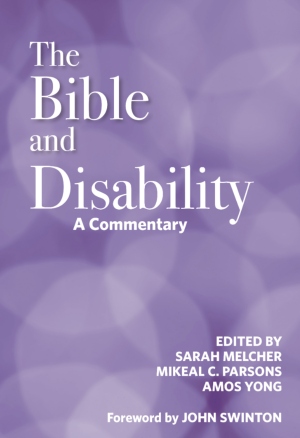The Bible and Disability: A Commentary
Interesting, important and challenging collection of essays that encourage us to read the Bible through the lens of a disability hermeneutic
 The Bible and Disability: A Commentary
The Bible and Disability: A Commentary
Edited by Sarah Melcher, Mikeal C. Parsons and Amos Young
SCM press
ISBN: 978-0-334-05686-7
Reviewed by: Rosa Hunt
This is a one-volume commentary on the Bible with a difference: it encourages us to read the Bible through the lens of a disability hermeneutic. This challenges our assumptions that we need to fix what is “broken” and to normalise the “different”. It thus provides a different view of the nature and role of healing and redemption. It also challenges our idea of who God is and what God is like, starting as it does with Nancy Eiesland’s image of the disabled God as a liberating symbol.
The book consists of 12 chapters: Beginnings (Genesis and Exodus), Law (Leviticus-Deuteronomy), History (Joshua-Second Kings, then 1 and 2 Chronicles and Esther), Wisdom (Job, Proverbs and Ecclesiastes; Psalms, Lamentations and Song of Songs), Prophets (Isaiah, Jeremiah, Ezekiel, Daniel and the twelve minor prophets), Synoptic Gospels and Acts, Johannine Literature, Pauline Letters and Hebrews and the Catholic Letters.
The essays represent a variety of methodological approaches and a whole spectrum of assumptions on the nature and authority of Scripture. What they have in common is their attempt to foreground disability as a hermeneutic. They start from the assumption that Scripture is redemptive for disability, and that if Scripture is not good news for those with disabilities, then it is not good news for anyone.
Most of the essays operate with a cultural understanding of disability - for instance, the first essay explores infertility as a disability in the lives of the matriarchs and patriarchs of Genesis. Other essays also explore the links between disability and divine punishment, sin and demonic possession in the Biblical narrative, while yet others tackle the emotive and complex issues such as God’s intent and sovereignty in creating people with disabilities.
I have never read the Bible through this lens before, and for this reason these essays make a very interesting, important and challenging read for those like myself who have tended to read the Bible from an able-bodied perspective.
Rosa is the minister of Salem Baptist Chapel, Tonteg and is an Associate Tutor at South Wales Baptist College
Baptist Times, 09/01/2019